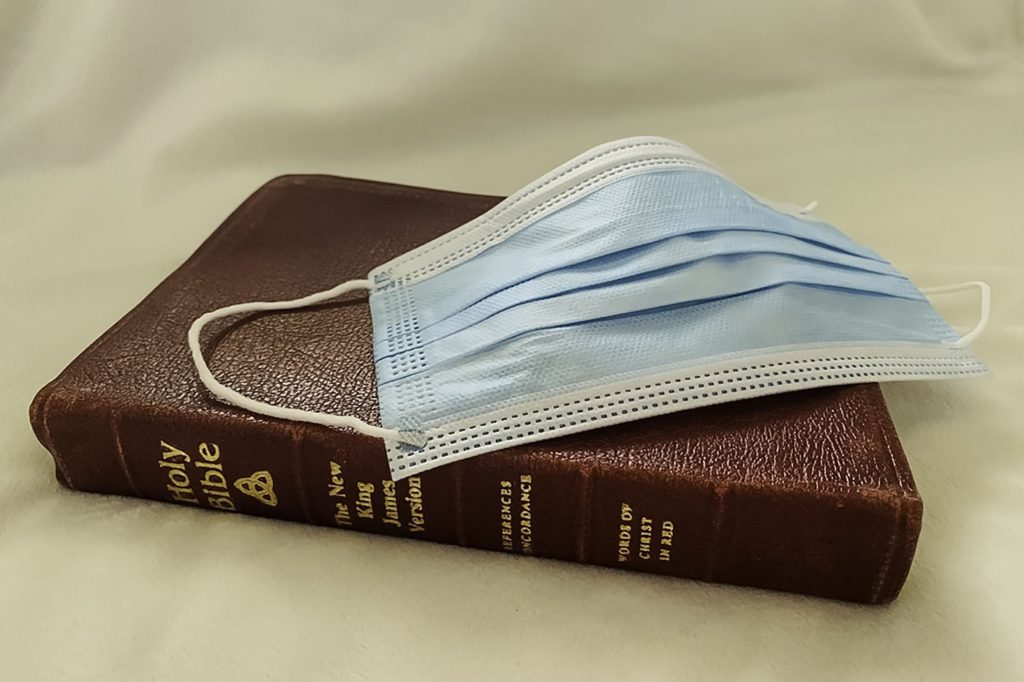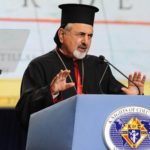Several state governments and some big cities reimposed mask mandates this summer and fall as the highly infectious Delta variant of COVID-19 spread through the United States. Some of these local governments—including a county in Ohio, a school district in Missouri, and the state of Virginia—allow citizens to claim a religious exemption from the mandate.
Should Christians claim this exemption? Are there grounds for claiming that masks violate our Christian faith?
We write as a pair of Baptists—a theologian and a political theorist—who passionately believe in and have written defenses of religious freedom as a biblical doctrine. We believe that religious freedom is the “first freedom,” a cornerstone—perhaps the cornerstone—of the American experiment, and that its protection is an absolute non-negotiable principle in any conception of earthly justice.
While we believe there are legitimate debates about the effectiveness and wisdom of masks in varying conditions, we believe Christians should not claim religious exemptions from mask mandates. To put matters succinctly, if one opposes mask mandates (and one or both of the authors of this essay do, depending on the circumstance and details), one should do so on the basis of whether masks are a prudent public health measure consistent with America’s liberty rubric, not whether masks or mask mandates disturb one’s relationship with God.
Start your day with Public Discourse
Sign up and get our daily essays sent straight to your inbox.
The Biblical Case for Religious Freedom
We want to begin with a refresher on the biblical grounds for, and purpose of, religious freedom. At root, we value religious freedom not because we value a marketplace of ideas, because uncompelled faith is sincerer and more genuine, because we hold the individual conscience sacrosanct, or because it prevents religious tyranny. These are all good byproducts of religious freedom, and should bolster our support for it, but they are not the ultimate or foundational justifying principle for religious freedom.
The foundational reason to support religious freedom is because it is a biblical principle embedded in the separate jurisdictions God gave to the church and the state. God ordained two distinct institutions with separate roles, responsibilities, and authorities. God created the church to mediate right worship of himself. He gave the church the keys to the Kingdom of God (Matthew 16), signifying the church’s authority to speak in Jesus’ name, preach his word, and disciple and shepherd his people. God created the state to regulate earthly peace, justice, and order (Romans 13). Respecting the boundaries of these institutions is a matter of obedience to God’s design for them.
Americans tend to think of religious freedom principally as a matter of conscience, because that is what the Enlightenment philosophers like John Locke or J.S. Mill emphasized. But in the Bible, religious freedom is fundamentally about jurisdictional boundaries. To be clear, we agree that protecting the individual conscience is important. The Bible plainly shows that there is no compulsion in matters of religion and it counsels even fellow believers not to challenge each other’s consciences on disputed matters (Romans 14). But it is important to recognize that the freedom of religion is, in one sense, broader than freedom of conscience, because it includes religious worship, religious activity, religious association, and religious speech, not merely religious belief.
In another way, religious freedom can appear narrower than the freedom of conscience is now often interpreted to be. If we emphasize religious freedom as a matter of conscience, that could, in principle, be extended to essentially any realm of human activity, and religious freedom could excuse us from anything we wanted. But since religious freedom is founded on jurisdictional boundaries, the church’s boundaries are the lines within which our conscience rightly takes precedence over law. By extension, they are also the boundaries outside of which the government has rightful jurisdiction, where law ought to reign, and where we should humbly submit.
Our conscience takes precedence over secular authority within the realm encompassed by the church’s jurisdiction: on issues touching religious worship, belief, practice, association, and speech. The apostles rightly disobeyed the Sanhedrin in Acts 5 because they commanded them to do something against God’s command and thus against their Scripturally bound conscience. Martin Luther famously insisted, “I cannot and will not recant anything, for to go against conscience is neither right nor safe. Here I stand, I can do no other, so help me God,” when the authorities demanded he recant his religious beliefs and writings. Put plainly: We can disobey the government when it commands us to do something, or refrain from doing something, within the realm of the church’s writ. The government simply does not have authority to make law regarding the right worship of God.
Our conscience does not take precedence over law outside that realm. The Bible does not say that our conscience is the final authority on all matters. The Bible is the ultimate authority, and where it is silent, government may exercise jurisdiction. Religious freedom is not a get-out-of-jail-free card that lets us evade whatever laws we dislike. Nowhere does the Bible hint that we have the individual authority to examine all laws, determine which are good and which are not, and select, à la carte, which are binding and which are not.
(We recognize there is a related conversation about civil disobedience of unjust laws, one that we do not have space to fully unpack here. We note, in brief, that the question at stake regarding mask mandates is whether or not Christians can claim religious exemption from a law, not whether the law itself is unjust. Second, while there are circumstances under which civil disobedience is permissible, a key principle of civil disobedience is accepting the consequences of lawbreaking to dramatize the injustice of bad laws. Civil disobedience is not an escape hatch for Christians to evade laws they disagree with and the consequences of lawbreaking).
Our conscience does not take precedence over law outside the realm encompassed by the church’s jurisdiction.
Masks and the Authority of the State
In this light, the proper question to ask about mask mandates during a pandemic is not: “does this violate my conscience?” but rather, “is this within the state’s jurisdiction?” How do we know what is within the church’s jurisdiction and what is in the state’s jurisdiction? Clearly, we start with the Bible. If the directive is rightfully within the state’s authorized jurisdiction, the issue is whether it is wise and in keeping with sound legislative judgment. To be clear, a religious liberty issue need not arise only when a biblical text can be cited, but when the offense would violate natural law as well.
In the case before us, masks offend neither the text of Scripture nor the natural law.
The Bible nowhere addresses mask-wearing, but in the Old Testament ancient Israel did have laws dealing with public health, suggesting that public health measures are within the legitimate scope of government. The Bible does not endorse or prohibit wearing masks as part of temple worship. It does not list mask-wearing among the sins it condemns in the New Testament, nor among the list of admirable good works to be performed. The Bible is utterly silent about masks one way or the other. We can safely conclude that the wearing or not wearing of masks is not part of religious worship or religious activity. Thus, it is not protected by religious freedom, and it is rightfully within the government’s jurisdiction to mandate or forbid.
On the other hand, the Bible does command us to “honor the emperor” (1 Peter 2:17), to “give to Caesar that which is Caesar’s” (Matthew 22:21), and to “be subject to the governing authorities,” because they have been “instituted by God” and “whoever resists the authorities resists what God has appointed” (Romans 13:1-7). The Bible is specific, clear, and direct: Christian should obey the government. There are exceptions, but they should be exceptional—rare and justified by specific Biblical principle. If the government tells us to wear a mask, we should wear a mask.
We say this without comment on the wisdom or foolishness of mask mandates, or on the validity or fraudulence of the science behind them. It simply does not matter whether you agree or disagree with the reasoning behind mask mandates. The Bible does not say we may disobey laws just because we think they are foolish, unscientific, or inconvenient. Jesus commanded us to give to the same Caesar who would shortly order his execution. Paul told us to honor the emperor who ordered persecution against Christians. He called the Roman government the ordained servant of God and commanded our obedience to it when whole swaths of its laws were based on pagan superstition, augury, divination, and haruspicy. If ancient Christians were to obey laws and social norms that were founded on the reading of chicken bones or the alignment of the stars, we should find no conscientious objection to obeying the CDC.
If we think the CDC is wrong, then we should elect better officials who will in turn appoint more effective leaders of those kinds of government entities. We live in a democratic society in which we have the opportunity to advocate our views on public matters. We understand some Christians want to advocate against mask mandates. That’s fine. We suggest, however, that opposing masks should be based on one’s views about masks’ effectiveness and practicality, not on their supposed threat to religious liberty.
If we think the CDC in wrong, then we should elect better officials who will in turn appoint more effective leaders of those kinds of government entities.
What’s Wrong with “Loopholes”
So far, we’ve been talking about the sincere use of the religious freedom exemption. But we also want to address reports that some are apparently invoking religious freedom insincerely, using it as a loophole to evade mask mandates they think are unnecessary, uncomfortable, or unscientific.
While we are sympathetic to Americans’ widespread impatience with the pandemic and with governments’ shifting and inconsistent public health measures, we do not think that is reason to casually invoke religious freedom as a loophole to avoid laws we dislike. This is simply a form a lying, a violation of the Ninth Commandment, claiming a belief that one does not actually hold. Worse, it is lying about one’s religion, about what one believes God to have said about himself and his character. Christians clearly should not claim religious exemption from mask mandates out of convenience.
We have heard some critics argue that taking advantage of the religious exemption is permissible in the same way that slightly exceeding the speed limit is permissible, or filing one’s taxes in the most legally advantageous way is permissible. We live in a complex society with innumerable, byzantine rules, some of which are understood to be more flexible than others. In this view, when the government provides for religious exemptions to mask wearing, we should understand those exemptions as the normal loopholes that we can take advantage of without difficulty.
We do not think these are appropriate analogies. First, we are not actually persuaded a little bit of speeding is permissible; but even assuming it was, speeding is a matter of degree. We can break the speed limit by a single mile per hour, or by twenty, and the gravity of the infraction increases with the amount by which we have exceeded the limit. Mask-wearing, by contrast, is all-or-nothing. Not wearing a mask isn’t a one-mile-per-hour infraction or a twenty-mile-per-hour infraction. It is a declaration that speeding laws do not apply. Even Christians who justify a little bit of speeding understand that speed limits are legitimate in principle; claiming that speed limits are intrinsically wrong would be absurd on its face. The government makes traffic laws for our safety, and we should obey them, even when they are inconvenient.
Mask-wearing is also not like tax compliance. Tax law is notoriously complicated and sometimes contradictory, creating a situation of legal ambiguity in which we are free to align our lawful compliance, to the best of our ability, with our own convenience and self-interest. Some people hire professional tax preparers to arrange their taxes in legally sound but personally advantageous ways, finding the right deductions and the best way to characterize their income. In the same way, some believe, the religious exemption loophole to mask-wearing is simply an invitation for us to use the law to our best advantage.
But the law mandating masks is not complicated or contradictory. It is simple, straightforward, and easily understood. The exemptions for religious or medical reasons are also clear and straightforward. (The science behind a particular public health measure may be complicated or contested, but we do not have to understand or even agree with a government’s reasoning to obey its law). When tax law creates complicated but lawful deductions and loopholes, it is not an invitation to use them insincerely, even if lawfully. That is even more true for mask-wearing because the both the law and the exemptions are not hard to understand and do not create a situation of legal ambiguity. Mask mandates are not ambiguous, and we do not have wiggle room that might otherwise justify taking advantage of loopholes.
Claiming religious freedom insincerely cheapens and trivializes a vital Biblical doctrine and constitutional right and involves believers in casually bearing false witness. We are concerned that abusing religious freedom this way could backfire, undermine support for it, and possibly motivate policymakers to redefine and constrict religious freedom in the future. We firmly believe no one should claim a religious exemption from mask mandates that they do not actually believe in.
Claiming religious freedom insincerely cheapens and trivializes a vital Biblical doctrine and Constitutional right and involves believers in casually bearing false witness.
The Perversion of “Religious Liberty”
There are difficult and contested issues on the borderline between the jurisdictions of church and state, such as military service (for which there is a long tradition of conscientious objection). Today, there is an ongoing legal dispute over whether Christians who sell the products of their artistic talents—such as floral arrangement or cake decorating—must be compelled to sell those products to all customers regardless of purpose, even if that purpose would violate their Christian faith. We believe religious freedom can and should extend to such cases, since the rationale of the commercial exchange directly implicates clear issues of Christian ethics. Further, we foresee circumstances where objecting to masks in specifically religious contexts could be justified (i.e., a worship service), but that is separate from a general public mandate and would need to be evaluated legally within that particular context.
But as with speed laws and tax compliance, there is no analogy to mask-wearing. Public health measures are not in a disputed zone between the jurisdictions of church and state. Wearing a mask does not involve the moral complexity and agonizing choices of military service. Wearing a mask does not require answering complicated questions about civil rights law, access to public accommodations, discrimination, or the intersection of religious faith with the marketplace.
We are concerned that the argument in favor of religious exemptions from mask mandates unjustifiably extends the realm of personal conscience well beyond what is Biblically warranted. It amounts to the claim that every individual is their own self-sovereign, that there is no moral foundation of government except consent, and that we have no intrinsic responsibilities beyond ourselves to family, society, or the world. Conservatives love to criticize Justice Anthony Kennedy’s infamous passage in a 1992 Supreme Court decision to the effect that, “At the heart of liberty is the right to define one’s own concept of existence, of meaning, of the universe, and of the mystery of human life.” But that is the functional theology of those claiming religious exemption from mask mandates.
It amounts to the claim that any activity in life counts as “religion,” and thus the realm within which the individual conscience takes precedence extends to literally anything we want it to. Such a view represents the triumph, not of a Biblical view of government and human society, but an extreme Enlightenment view, one expressed today among libertarians on the right and progressives on the left. Taken to its logical conclusion, that interpretation of religious liberty would undermine all government and all human civilization. It would be a tragedy if that ended up being the fruit of centuries of Biblical reflection and constitutional development protecting religious freedom.














